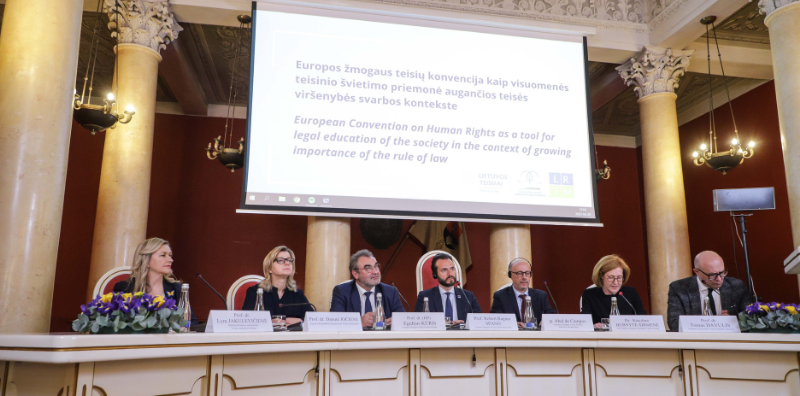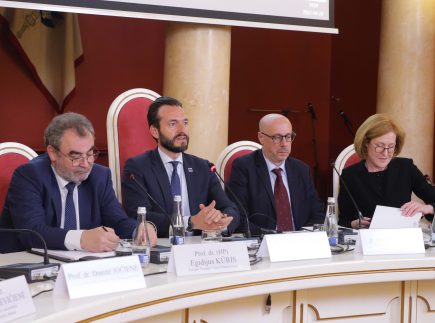
April 29th, the President of the European Court of Human Rights (ECtHR) Robert Ragnar Spano and the Deputy Registrar Abel Campos visited Vilnius. They took part in a discussion, along with Mykolas Romeris University (MRU) Law School Dean Prof. Lyra Jakulevičienė and other members of the legal community. The roundtable discussion, “The European Convention on Human Rights as a Tool for Legal Education of the Public in the Context of the Growing Importance of the Rule of Law” was held in Vilnius. They discussed the importance of the Convention for the development of the national legal system, the necessity to apply the provisions and principles of the Convention at the national level as a minimum standard for the protection of human rights and freedoms, discussed the unprecedented challenges to humanity and human rights posed by the COVID-19 pandemic, the regional migrant crisis on the border with Belarus and the war in Ukraine and the threats they pose.
ECtHR Judge Egidijus Kūris from Lithuania participated in the discussion along with Lithuania’s Constitutional Court Chairwoman Danutė Jočienė; Mykolas Romeris University (MRU) Law School Dean Prof. Lyra Jakulevičienė; and Vilnius University Law Faculty Dean Prof. Tomas Davulis. The discussion was moderated by Karolina Bubnytė-Širmenė, Representative of the Government of the Republic of Lithuania at the European Court of Human Rights.
During the discussion, MRU Law School Dean Prof. Jakulevičienė drew attention to human rights protection in crisis situations and to strike the right balance between the interests of the individual and society and the state. Referring to studies conducted by MRU researchers on human rights restrictions during the COVID-19 pandemic, she noted that in many so-called "pandemic" cases, national courts advocate protecting the public interest against the individual, emphasizing the duty of states to take positive action to protect individuals and the responsibility of the individual to act properly.
The limited case law of the ECtHR in the context of pandemic cases also allows for a wider development of positive national commitments. The Dean emphasized that, at least on the basis of current state practice, it could be said that the pandemic had not set a new precedent that would require a different approach to human rights restrictions in the event of a pandemic crisis. Another case mentioned is the migration crisis, which the professor believes is already changing not only national practices, especially with regard to the application of the ban on collective expulsions, but also the recent case law of the European Court of Human Rights reveals some new aspects of this ban which in light of the complex situations facing states, the Court is developing. However, there is still a lack of common guidelines on whether, and if so, how national human rights obligations in crisis situations should be modified. The situation is specific in each of the cases, so it seems that it is too early to talk about the fact that crises fundamentally changes the balance between the protection of the interests of the state and the individual.
Róbert Spanó has been the President of the ECtHR since May 2020. His visit was organized by the Constitutional Court, the Judicial Council, and the Ministry of Justice of the Republic of Lithuania.

